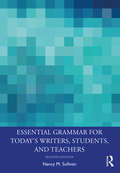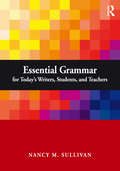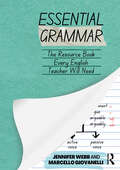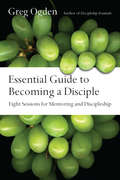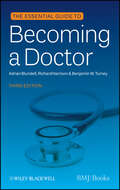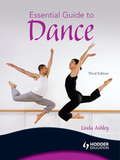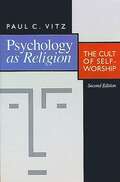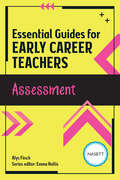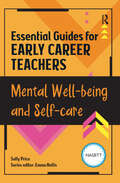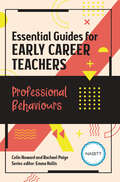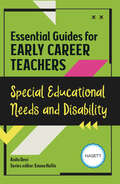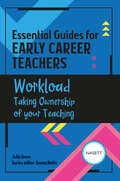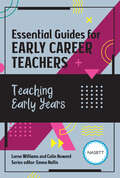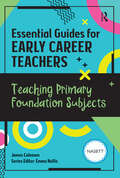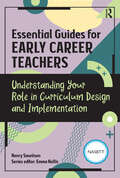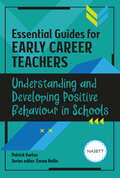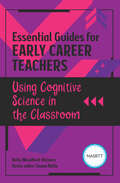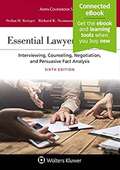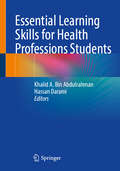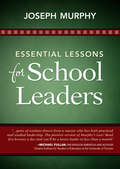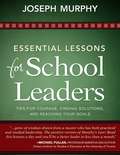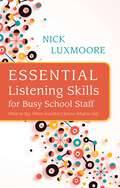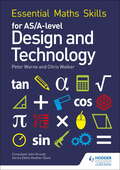- Table View
- List View
Essential Grammar for Today's Writers, Students, and Teachers
by Nancy M. SullivanThis innovative grammar text is an ideal resource for writers, language students, and classroom teachers who need an accessible refresher in a step-by-step guide to essential grammar. Rather than becoming mired in overly detailed linguistic definitions, Nancy Sullivan helps writers and students understand and apply grammatical concepts and develop the skills they need to enhance their writing. Along with engaging discussions of both contemporary and traditional terminology, Sullivan's text provides clear explanations of the basics of English grammar and a practical, hands-on approach to mastering the use of language. Complementing the focus on constructing excellent sentences, every example and exercise set is contextually grounded in language themes. This updated edition includes new sections in each chapter on Writing Matters (addressing key tools and concerns for writers) and Language Varieties (addressing issues of social and regional dialect variation). This is an ideal textbook for any writing course across disciplines where grammatical precision is important. Online resources including additional exercises, links, and an answer key are available at Routledge.com/9780367148683. Instructor materials accompanying the text provide teachers with activities designed for face-to-face, hybrid, and online instruction to enliven these basic grammar lessons as well as writing activities to integrate these concepts into students' own writing.
Essential Grammar for Today's Writers, Students, and Teachers
by Nancy SullivanThis innovative grammar text is an ideal resource for writers, language students, and current and future classroom teachers who need an accessible "refresher" in a step-by-step guide to essential grammar. Rather than becoming mired in overly detailed linguistic definitions, Nancy Sullivan helps writers and students understand and apply grammatical concepts and develop the skills they need to enhance their own writing. Along with engaging discussions of both contemporary and traditional terminology, Sullivan's text provides clear explanations of the basics of English grammar and a highly practical, hands-on approach to mastering the use of language. Complementing the focus on constructing excellent sentences, every example and exercise set is contextually grounded in language themes. Teachers, students, and writers will appreciate the streamlined, easy-to-understand coverage of essential grammar, as well as the affordable price. This is an ideal textbook for future teachers enrolled in an upper-level grammar course yet is also suitable for any writing course across disciplines where grammatical precision is important. Instructor materials accompanying the text provide teachers with activities designed for face-to-face, hybrid, and online instruction to enliven these basic grammar lessons as well as writing activities to integrate these concepts into students' own writing.
Essential Grammar: The Resource Book Every Secondary English Teacher Will Need
by Marcello Giovanelli Jennifer WebbWhat is grammar? Why is it so central to the teaching of English? How can we teach it with confidence in secondary schools? Essential Grammar will provide clarity, meaning and teacher expertise to this much debated area of the English curriculum. By exploring grammar as applied to literary analysis and using a range of examples from commonly-taught and popular texts, this highly accessible book provides an extensive overview of how to use grammar to enhance the teaching of academic and creative writing. Drawing on a range of resources, best-selling authors Webb and Giovanelli: discuss the context of grammar teaching in schools provide a clear overview of concepts and terminology for the teacher offer a wide range of examples of how grammar can be applied to the analysis of texts and the development of students’ writing debunk the unhelpful view of grammar as a list of prescriptive rules and limits outline grammatical concepts in a way which is clear and simple to understand provide a huge range of practical ways to ensure that teaching of grammatical concepts can be rigorous and successful for all. This resource, with its grounded and straightforward approach to grammar, will be immediately useable in the classroom with strategies that be used by teachers in their classroom today. For any training and practicing secondary English teachers, Essential Grammar will be a compulsory classroom companion.
Essential Guide to Becoming a Disciple: Eight Sessions for Mentoring and Discipleship (The Essentials Set)
by Greg OgdenWhat am I committing to when I say I want to follow Jesus?Discipleship Essentialsa core trutha Bible studya readinglife application
Essential Guide to Becoming a Doctor
by Richard Harrison Adrian Blundell Benjamin W. TurneyAll you need to know about becoming a doctor in the UKThis book contains all the help you need to become a doctor. From applying to medical school through to choosing your specialty, you can find out: How to choose a medical schoolHow to get into medical schoolHow to survive as a medical studentAll about electivesWhat life is like as a doctorAs well as easy to follow information on choosing, getting into - and surviving - medical school, junior doctors in different specialties provide unique insight with firsthand accounts of what the job is like in real life, to help you plan and decide your future career path. Included in this fully updated third edition is the latest information on admission tests, an admission table with practical details about each medical school (as well as greater coverage of graduate medical schools), making this now even more comprehensive for everyone planning a career in medicine.
Essential Guide to Dance, 3rd edition
by Linda AshleyThis third edition of the bestselling text ESSENTIAL GUIDE TO DANCE is thoroughly updated to meet the new AS/A2 specifications and relevant Applied A-levels, BTEC and other Dance qualifications. Now in full colour, highly illustrated, and packed with tasks and activities to cover all aspects of current courses, this text will appeal to both teachers and students.Students are brought right up to date with clear explanations of choreography, performance and appreciation of Dance, as well as recent examples of new set works and choreographers. With further video and photo interactive analysis tasks, the addition of short revision tests and updated professional examples alongside many contemporary photographs, ESSENTIAL GUIDE TO DANCE Third Edition provides students with comprehensive support and guidance.With its emphasis on the practical aspects of Dance and its interactive features that encourage effective learning, ESSENTIAL GUIDE TO DANCE Third Edition will be essential for all students of Dance and their teachers.Linda Ashley has extensive experience as a writer, choreographer, performer and teacher of Dance. Linda is currently Dance Research Leader at AUT University, New Zealand, Linda has written several Dance titles, published in the UK and New Zealand, including the two previous bestselling editions of ESSENTIAL GUIDE TO DANCE, both published by Hodder.
Essential Guide to Intercultural Communication
by Jennifer Willis RiveraThe Essential Guide to Intercultural Communication by Jennifer Willis‑Rivera (ISBN 978‑0312551902) is a non‑fiction, undergraduate-level communication textbook designed to introduce core concepts in intercultural communication using contemporary, real-world examples.
Essential Guides for Early Career Teachers: Assessment (Essential Guides for Early Career Teachers)
by Alys FinchThe Essential Guides for Early Career Teachers provide accessible, carefully researched, quick-reads for early career teachers, covering the key topics they will encounter during their training year and first two years of teaching.This title on Assessment provides a range of practical but critically engaged strategies and approaches to assessment. It offers a brief history of the core ideas and educational philosophy underpinning these, looks at links to planning and reflection, examines the concept of progress over time as a mirror for quality teaching and learning, and explores the idea of pupil self-assessment. Most importantly it recognises that assessment can and should be at the heart of enabling and accelerating the progress of all learners.Clear, accessible and practical. An unmissable guide to classroom assessment.Professor Dame Alison Peacock.
Essential Guides for Early Career Teachers: Mental Well-being and Self-care (Essential Guides for Early Career Teachers)
by Sally McWilliamThe Essential Guides for Early Career Teachers provide accessible, carefully researched, quick-reads for early career teachers, covering the key topics they will encounter during their training year and first two years of teaching. They complement and are fully in line with the new Early Career Framework and are intended to assist ongoing professional development by bringing together current information and thinking on each area in one convenient place.This title on Mental Well-being and Self-care explores these increasingly significant issues for those training to teach or in the early stages of their teaching career. It draws upon a new body of evidence-based knowledge and an emerging lexicon which fosters and supports mentally healthy routines as teaching practice develops. Critical but also practical, the text guides the reader through research-based concepts and reflective tasks central to positive mental health and well-being, supporting early career teachers as they develop their teaching skills and techniques.
Essential Guides for Early Career Teachers: Professional Behaviours (Essential Guides for Early Career Teachers)
by Colin Howard Rachael PaigeThis title outlines the personal and professional skills and behaviours needed to be an effective early career teacher beyond that of your own subject knowledge and class-based practices.It provides guidance on how to gain the most from mentoring conversations and how to develop good habits around workload and managing priorities. It helps you develop and understand the importance of engaging in self-reflection, professional development, building relationships and managing your well-being, encouraging you to consider your professional identity, values and motivators in order to become the best teacher you can be.The Essential Guides for Early Career Teachers provide accessible, carefully researched, quick reads for early career teachers, covering the key topics you will encounter during your training year and first two years of teaching. They complement and are fully in line with the new Early Career Framework and are intended to assist ongoing professional development by bringing together current information and thinking on each area in one convenient place.
Essential Guides for Early Career Teachers: Special Educational Needs and Disability (Essential Guides for Early Career Teachers)
by Anita DeviProvides you with the required knowledge and skills development around special educational needs and disability (SEND) as you progress through your early teaching career. Using an audit tool, the text builds on any previous training enabling you to ground and embed your practice for children and young people presenting with SEND. It recognises the increasing challenges you may face and distils the theoretical into usable techniques in the classroom. Critical but also practical, the text guides you through research-based concepts and reflective tasks central to understanding and supporting issues around SEND.
Essential Guides for Early Career Teachers: Taking Ownership of your Teaching (Essential Guides for Early Career Teachers)
by Julie GreerLinked to the Early Career Framework, this book provides practical time management and productivity strategies to help new teachers tackle the issue of workload.Workload is a key issue for most beginning teachers. Trying to cope with all the demands of a new job with an increasing burden of administration, reporting and assessment tasks, can be daunting at best and may even lead to significant mental health issues. But there is a way through it all! This book acknowledges the challenges that exist and suggests evidence-informed ideas that can be used both in and outside the classroom to create an acceptable workload. It takes a positive and proactive stance, encouraging early career teachers to implement strategies that will enable them to work more effectively and ultimately bring a high level of enjoyment and job satisfaction.
Essential Guides for Early Career Teachers: Teaching Early Years (Essential Guides for Early Career Teachers)
by Colin Howard Lorna WilliamsAimed at all beginning teachers involved in early years teaching.This text looks at the unique role of the early years teacher and outlines how you can support the development of children as unique individuals through an enabling environment, building success through effective relationships, outstanding provision and purposeful assessment. It encourages you to think about your own development in a holistic sense in order to promote outstanding professional practice.The Essential Guides for Early Career Teachers provide accessible, carefully researched, quick reads for early career teachers, covering the key topics you will encounter during your training year and first two years of teaching. They complement and are fully in line with the new Early Career Framework and are intended to assist ongoing professional development by bringing together current information and thinking on each area in one convenient place.
Essential Guides for Early Career Teachers: Teaching Primary Foundation Subjects (Essential Guides for Early Career Teachers)
by James ColemanAs Ofsted introduces a new framework with higher expectations regarding subject knowledge across the primary curriculum, there has never been a more important time for trainees to secure their subject knowledge and improve confidence. This book aims to help early career teachers in teaching primary foundation subjects.This is another text for the Essential Guides for Early Career teachers series and it provides ECT's and their mentors with the right tools for teaching primary foundation subjects, improving their subject knowledge and building understanding. It ensures that relevant theory and research are woven together with real classroom experience. It links to key readings, resources and online sources which will allow trainees to continue their own learning and encourage independent study through the use of reflective exercises and practical tasks to ensure the delivery of the best possible teaching.A text like this is needed more than ever as the Ofsted framework for ITT is explicit in highlighting subject knowledge as being a key component to successful teaching. This book, therefore, covers the kind of topics that ECT's might at first struggle with from art and design, to computing and IT to languages like French and German. This book breaks down each subject and points trainees in the direction of resources, support and best practice.
Essential Guides for Early Career Teachers: Understanding Your Role in Curriculum Design and Implementation (Essential Guides for Early Career Teachers)
by Henry SauntsonThis is a must-read for early career teachers (ECTs), focusing on the role of the ECT in terms of school curriculum design and implementation.It explores the topics surrounding curriculum that those in training or ECT induction are likely to encounter and need to understand, and offers a range of practical and critical strategies and approaches to curriculum design. It begins with examining the history of the core ideas around curriculum, including educational philosophy and concepts, before moving on to planning, reflection and principled intent and implementation. It also delves into the various roles of those involved in curriculum design.This is an essential text for ECTs as curriculum is a key aspect of the Core Content and Early Career Frameworks. It draws on real-life enactments and models to help those in their early stages understand their role in curriculum implementation, especially in relation to the Ofsted focus on the quality of education and the role of all teachers as professionals. Most importantly, this book recognises curriculum as the beating heart of any strong educational offer.
Essential Guides for Early Career Teachers: Understanding and Developing Positive Behaviour in Schools (Essential Guides for Early Career Teachers)
by Patrick GartonBehaviour is the number one concern for most early career teachers so this accessible book provides a range of research informed and road-tested strategies to support the development of positive classroom systems and structures. It offers key psychological insights into the factors that lie behind different behaviours, helping you understand and manage your own behaviours as well as those of the children and young people you teach. Chapters cover understanding individuals, the classroom environment and the wider school context, as well as working with parents and carers. Ultimately the book enables you to successfully work with groups of children and young people so that they can learn effectively and make progress.The Essential Guides for Early Career Teachers series provides accessible, carefully researched, quick reads for early career teachers, covering the key topics you will encounter during your training year and first two years of teaching. They complement and are fully in line with the new Early Career Framework and are intended to assist ongoing professional development by bringing together current information and thinking on each area in one convenient place.
Essential Guides for Early Career Teachers: Using Cognitive Science in the Classroom (Essential Guides for Early Career Teachers)
by Kelly RichensLinked to the Early Career Framework, this book provides an understanding of cognitive load theory and its application to teaching for all those training or new to the job. Cognitive science is fast becoming the cornerstone for understanding how students learn and is revolutionising the way we teach pupils at both primary and secondary levels. The techniques informed by cognitive science are evidence-based and proven to work, providing clear benefits for both the early career teacher and your pupils. This book outlines the principles of cognitive load theory and metacognition so that you can feel in control of your own learning and understand how to harness the learning of your students. It provides concise explanations and practical strategies that you can use in the classroom, enabling you to confidently plan and teach lessons with a reflective, metacognitive approach underpinned by key cognitive science principles.
Essential Lawyering Skills: Interviewing, Counseling, Negotiation, and Persuasive Fact Analysis (Aspen Coursebook Series)
by Stefan H. Krieger Jr. Neumann Renee McDonald HutchinsThe Sixth Edition of Essential Lawyering Skills: Interviewing, Counseling, Negotiation, and Persuasive Fact Analysis continues to emphasize the role of the attorney in the lawyer-client relationship. Widely respected practitioners and teachers, the authors’ introductions, visual aids, and realistic examples illuminate the basic mechanics of these key skills. Case situations and problem-solving scenarios engage students in developing essential lawyering skills that mirror legal practice.The topic of professional responsibility is integrated throughout. <p><p> New to the Sixth Edition: <p> New co-author René Hutchins brings her new perspective to the course <p>Updated and improved design makes the material more accessible for today’s student <p>Increased coverage of negotiation in the plea-bargaining context <p>Updated examination of the use of electronic media in fact analysis and negotiation <p><p>Professors and students will benefit from: <p> <p>An emphasis on practice and the mechanics of negotiation and persuasion, rather than on theory <p>Complete coverage of problem solving, interviewing, counseling, negotiation, and fact analysis <p>Remarkably clear and penetrating discussion of the persuasive value of facts, supported by useful visual aids <p>Generous use of interesting examples that place topics in context <p>Integrated coverage of professional responsibility where appropriate <p>Experienced authors, who draw upon many years of teaching and writing about lawyering skills
Essential Learning Skills for Health Professions Students
by Khalid A. Bin Abdulrahman Hassan DaramiThis book covers the learning and teaching objectives for the teachers and students of the health profession. It covers not only the conceptual framework of learning, teaching, and studying but also addresses students' needs, including effective communication, study habits, and stress management. The chapters integrate the basics of a course with its clinical science. From active learning strategies to problem-based learning techniques, the book covers effective methods for engagement and self-directed learning. Additionally, it addresses essential skills such as time management, critical thinking, and information retrieval. Supplemented with easy-to-read text, illustrations, and summary boxes explaining educational messages, the book aims to ease learning. The book is relevant for both students and professionals in medicine and health sciences, helping them understand the basics of teaching and learning for health professions students.
Essential Lessons for School Leaders
by Joseph F. MurphyKeep these heartfelt gems top of mind This gold mine of wisdom from top education researcher and the best-selling author of Turning Around Failing Schools andConnecting Teacher Leadership and School Improvement contains key tips and strategies every school leader should know. Award-winning professor and former school administrator Joseph Murphy’s concise and instructive lessons will help you stay focused on what matters most as you navigate the hectic world of high-stakes testing and accountability, for example: It really is all about the kids Optimism is essential Caring counts a lot Listen—let people finish talking Don’t confuse excuses and explanations
Essential Lessons for School Leaders: Tips for Courage, Finding Solutions, and Reaching Your Goals
by Joseph MurphyThis gold mine of wisdom from top education researcher and the bestselling author of Turning Around Failing Schools and Connecting Teacher Leadership and School Improvement contains key tips and strategies every school leader should know. Award-winning professor and former school administrator Joseph Murphy's concise and instructive lessons will help you stay focused on what matters most as you navigate the hectic world of high-stakes testing and accountability: It really is all about the kids Optimism is essential Caring counts a lot Listen-let people finish talking Don't confuse excuses and explanationsEach lesson is coupled with context in a few sentences taken from Murphy's extensive real-world experiences. This collection is ideal for use in daily reflections, speeches, staff meetings, presentations, or as a gift to anyone who works with children.
Essential Linguistics: What Teachers Need To Know To Teach ESL, Reading, Spelling, And Grammar
by Yvonne S. Freeman David E. FreemanThe authors make the Second Edition more valuable by clearly explaining English phonology, morphology, and syntax and the implications for teaching, using the International Phonetic Alphabet to prepare students for the Praxis examination, including chapters on first and second language acquisition research and theories, reviewing ESL teaching methods. With examples, activities, and end-of-chapter applications that link linguistic theory and classroom practice, the authors show teachers how to use their new understandings of linguistics to help student learning.
Essential Listening Skills for Busy School Staff: What to Say When You Don't Know What to Say
by Nick LuxmooreHow do you listen effectively when you're already late for a meeting? How do you respond to a girl who's so angry that she's threatening to hit someone? Or to a boy who feels like giving up altogether? How do you listen, not only to students, but also to parents and to colleagues? Whatever your role in school, listening will be at the heart of what you do. Your school will be measured, in part, by the quality of its daily relationships and those relationships will depend on how confidently people are able to listen to each other. This book answers all the difficult questions about how to listen, what to say, confidentiality and more. Helping with particular issues such as bullying, relationship difficulties, depression and self-harm is also covered. With over 35 years' experience in a variety of school roles, Nick Luxmoore offers practical, realistic answers, advice and guidance. This book will be essential reading for teachers and non-teachers alike.
Essential Mathematics for Political and Social Research
by Jeff GillEssential Mathematics for Political and Social Research addresses an educational deficiency in the social and behavioral sciences. This 2006 book was the first of its kind to specifically address the comprehensive introduction to the mathematical principles needed by modern social scientists. The material introduces basic mathematical principles necessary to do analytical work in the social sciences, starting from first principles, but without unnecessary complexity. The core purpose is to present fundamental notions in standard notation and standard language with a clear, unified framework throughout. Through examples and exercises, this book is intended to not only motivate specific mathematical principles and practices, but also introduce the way that social science researchers use these tools. The intended emphasis is on conceptual understanding of key principles and their subsequent application.
Essential Maths Skills for AS/A Level Design and Technology
by Chris Walker Peter WarneDon't let your students miss out on easy marks, prepare them for those Maths questions with this essential guide.Written specifically to build students' confidence in maths and to prepare them for the more challenging mathematical requirements which make up 15% of the new DT specifications.- Improve confidence with structured progression of worked examples, guided and non-guided questions, and worked solutions for every question- Strengthen students' maths skills and subject understanding with worked examples andpractice questions all embedded in the subject context- Develop exam confidence with exam-style maths questions- An essential tool throughout the AS and A Level course with every maths skill mapped tosubject topics, and applicable to every major exam board- Reviewed by subject and maths expert Glyn Granger (former D&T chief examiner)
